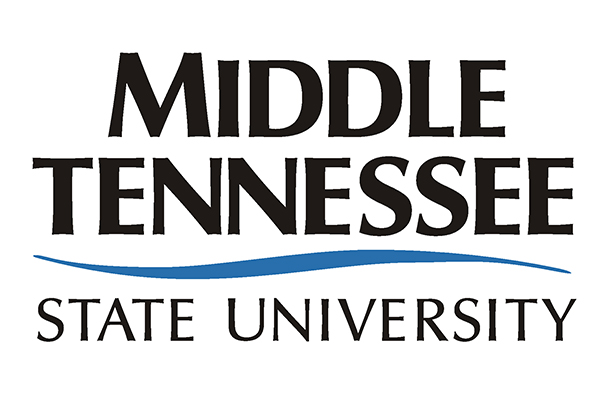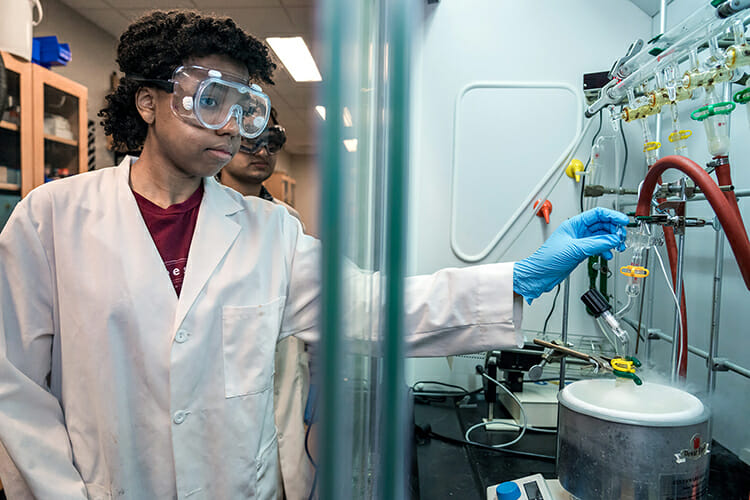High school senior Jessica Bullock of Murfreesboro, Tennessee, did not hesitate when given the opportunity to participate in MTSU’s Project SEED Program.
The 16-year-old Central Magnet student heard about the summer immersive program through a friend who had previously participated, and what she learned sparked her interest.
“I thought, ‘That’d be a good opportunity for me,’ so I decided that I’d try and apply for the position as well,” said Bullock, who said she’s somewhat familiar with the Blue Raider campus after taking dual-enrollment classes last year.
Project SEED — Summer Education Experience for the Economically Disadvantaged — is a program sponsored by the American Chemical Society that gives high school juniors and seniors an opportunity to gain scientific knowledge through research and hands-on activities in academic, industry and government research labs across the country, including MTSU’s.

Central Magnet School senior Jessica Bullock dons her lab gear outside the MTSU Science Building in mid-June to prepare for work on part of the Project SEED program this summer. Project SEED — Summer Education Experience for the Economically Disadvantaged — is a program sponsored by the American Chemical Society that gives high school juniors and seniors an opportunity to gain scientific knowledge through research and hands-on activities in academic, industry and government research labs across the country, including MTSU’s. (MTSU photo by J. Intintoli)
Professors help guide the students on project work throughout the summer as they get a taste of potential future careers. Bullock commutes to campus for MTSU’s Project Seed program, which operates on the second floor of the Science Building.
Bullock mentioned how proud her parents, Joan and David Bullock, were when they heard the good news about her getting into the program. She also received a $2,500 stipend from the American Chemical Society and MTSU Office of Research Services Director Jeff Porter.
“They were pretty much like, ‘Go for it!’” Bullock said of her parents. “They thought it was a good opportunity as well.”
Now into the program a few weeks, Bullock is contributing to tackle a National Science Foundation research project under the advice of Dr. Keying Ding, an assistant chemistry professor at MTSU.
“Jessica is at the start of the project and still learning certain skills to ensure project success, such as column chromatography, a method for separating organic products.” Ding said.
This project’s goal is to use a metal complex as a catalyst to trigger chemical reactions between the compound amines and alcohols, resulting in amine or imine products that are important chemicals for pharmaceutical companies.

Central Magnet senior Jessica Bullock, shown at center right, listens as her mentor, MTSU chemistry professor Keying Ding, center front, and graduate student Bedraj Pandey give instructions for a research project inside the MTSU Science Building in mid-June as part of the Project SEED program this summer. Project SEED — Summer Education Experience for the Economically Disadvantaged — gives high school juniors and seniors an opportunity to gain scientific knowledge through research and hands-on activities in academic, industry and government research labs across the country, including MTSU’s. (MTSU photo by J. Intintoli)
Despite the intensity of learning, Ding said she’s confident Bullock is catching on.
“Jessica is keen to explore chemistry research fields. She is brilliant, focused and has strong work ethic. Now she is ready to take solid steps towards project success.” she said.
When Bullock is not in the lab, she enjoys reading, drawing and writing music. At Central, she’s involved in extracurricular activities such as book club and the Health Occupations Students of America, and she has also recently been accepted into the Science National Honor Society.
Bullock, the only high school student in this year’s Project SEED Program, interacts with undergraduate and graduate students working in the lab with her. They discuss progress with their different research projects, she said, and some of the international students teach her about their culture.
“Some of the students have introduced certain words in their home language, so I thought that was pretty cool,” she said.
During her short time at MTSU, Bullock said she’s noticed how different college is from high school.
“There’s a little bit more freedom, because at (high) school, you have the teacher that’s kind of always on you,” Bullock said. “Here, it’s like you’re given a task, and you kind of just complete it with the best of your ability, and ask for help when you need it.”
After graduation, Bullock said she plans to major in biochemistry at a major university.
— KeWana McCallum, student intern (news@mtsu.edu)

Central Magnet rising senior Jessica Bullock works on research project inside the MTSU Science Building in mid-June as part of the Project SEED program this summer. Project SEED — Summer Education Experience for the Economically Disadvantaged — is a program sponsored by the American Chemical Society that gives high school juniors and seniors an opportunity to gain scientific knowledge through research and hands-on activities in academic, industry and government research labs across the country, including MTSU’s. (MTSU photo by J. Intintoli)


COMMENTS ARE OFF THIS POST